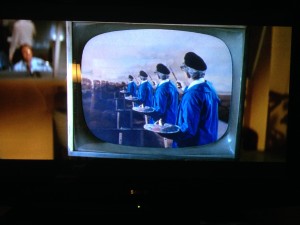We spent Christmas quality family time with the 5 original Planet of the Apes movies. (Seven months later, I found this post in my drafts folder).
You’d think we’d have these movies memorized by now, but when you’re dealing with such a sprawling franchise things get a bit hazy, even for Highly Trained Professionals such as ourselves.
After all, we’re not dealing with a mere trilogy. The first film, Planet of the Apes (1968), was adapted from a French novel, Pierre Boulle’s La Planete des Singes (1963) and was followed by 4 sequels in 4 years: Beneath the Planet of the Apes (1970), Escape from the Planet of the Apes (1971), Conquest of the Planet of the Apes (1972), and Battle for the Planet of the Apes (1973).
Plus, there were 2 TV series (1 live-action and 1 animated), 1 execrable reboot (2001), 2 prequels – (Rise of the Planet of the Apes (2011) and Dawn of the Planet of the Apes (2014) – and a whole bunch of comic books.
Plus, there’s time travel. Time travel that contradicts the time line established in the narrative – a narrative that’s already a bit nonsensical to begin with, to boot.
The 3rd film, Escape from the Planet of the Apes, may be a terrible movie, but it’s also terribly entertaining. And it’s got Ricardo Montalban and Eric Braeden giving the scenery a pretty thorough chew, so there’s that.
There’s a delightfully nutty scene in which Presidential Science Advisor Dr. Otto Hasslein (Braeden) goes on the nightly news and explains time travel. I couldn’t find the full scene on youtube, but I did find a remix called “A Lesson in Regression” that does it justice:
You really should watch Escape from the Planet of the Apes, if only to be thankful that the new prequels forego time travel in favor of something slightly more science-y and slightly less what-the-fuck-y.
Still the old films have something the new ones never will: 70s fashion. And, of course, Ricardo Montalban.
